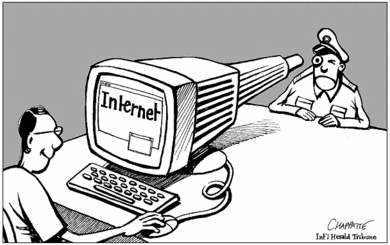
- Online usage is closely monitored by the government limiting what can be seen and posted. https://theconnectivist.files.wordpress.com/2015/03/china-censorship1.gif
We as people have always valued our right to speak our minds. Whether it’s in person or online, we’re allowed to have a voice. But what if that was taken away from you? How would you react? There are many countries around the world that have regulatory governmental laws strictly enforcing online censorship. Social media restrictions and governmental controls have created a world where limited access is granted to the people of certain countries. Two of the countries that have gone to great lengths to enforce a certain level of restriction are Cuba and China.
How far is one country willing to go to obtain control of online censorship? Cuba went so far as to “[have] it’s on Internet, though the better term is probably Intranet” similar to what one may use in a work space “except an entire country is on it” (Scola). That’s the definition of maximum border control. Everything is barricaded in with no wiggle room to get out. They’ve created a world where “visiting international sites cost about seven times what it costs to get on the national Intranet [and] given that the average monthly salary in Cuba is […] $20, [price] differences can be an effective nudge towards sticking in the Cuban digital cul-da-sac” (Scola). This restriction, though legal, is unfair. The average person cannot afford to have Internet access so they stick to what is financial reasonable. It’s easy to infer this is an indirect way to allow only the elites of the country such as doctors and lawyers to have access to knowledgeable information. The government is able to limit access with its elevated pricing and it’s ability to control the connectivity of its country with outside nations.
If the country is bigger, does regulation become harder? China, being an exceptionally large country manages to control quite a bit since it has created a “censorship infrastructure [that] is incredibly efficient” (Toyama). They’ve done so by simply regulating what can and cannot be broadcasted to the public of China. Posts are monitored and controlled having a “near-perfect elimination rate” if objectionable content is published (Toyama). Being able to normalize certain posts and create an online world where it’s clear what can be openly voiced grants the government power over the people. Not only does limiting the posts and websites create a sense of closed-community within the country, “the ban on Western social media sites like YouTube and Facebook [give] home court advantage to China’s” own people (Stout). This allows the people in China who want to climb up on the social ladder, to excel in increased time by cutting out potential competition. Closing the people out from Facebook reinforces the idea of having single-mindedness. To answer my previous question, I believe strong governmental control doesn’t get harder as the country’s size increases; it just calls for more boundaries to keep the people caged in.
Though Cuba and China both want to control online censorship, each country handles the topic in it’s own way. In Cuba, “so few people have internet access, you don’t need to censor [much]” while “in terms of blocking content, Cuba is no China” allowing people to read news websites and non-governmental sites promoting human advocacy (Franceschi-Biccheira). China allows more online time, but limits access to what can be seen, while Cuba limits access granted to the people as well, but what’s viewed isn’t as censored. In Cuba, you “have to provide an ID to use a computer” which essentially throws anonymity out the window (Franceschi-Biccheira). This creates an idea of self-censorship and a constant reminder that you cannot hide who you are or where you are, because you are always being seen. Similarly in China, “the Chinese government is shutting down VPNs—Beijing’s latest move to shore up its cyber-authority” by eliminating the use of the Internet to connect to a private network (Stout). Each country is taking steps towards to removal of privacy and is making great strides to assert dominance on the people.
The Internet has become a very powerful tool in society. It’s helped increase the reach between nations, but this isn’t what all countries want. Both Cuba and China are clear examples of countries that want to limit what the people see, but also want the country itself to flourish. China has done so by limiting social media access and Cuba by using socioeconomics to restrict access. Both countries have created boundaries to help restrict the people and formulate a suitable level of online censorship.
Works Cited (MLA)
Francheschi-Bicchierai, Lorenzo. “The Internet in Cuba: 5 Things You Need to Know.” Mashable. N.p., 3 Apr. 2014. Web. 16 Feb. 2016. <http://mashable.com/2014/04/03/internet-freedom-cuba/#gBsu8wkN5kqf>.
Scola, Nancy. “Wait, Cuba Has Its Own Internet?” Washington Post. The Washington Post, 19 Dec. 2014. Web. 16 Feb. 2016. <https://www.washingtonpost.com/news/the-switch/wp/2014/12/19/wait-cuba-has-its-own-internet/>.
Stout, Kristie Lu. “China’s Great Firewall and Internet Censorship – CNN.com.” CNN. Cable News Network, 25 Mar. 2015. Web. 16 Feb. 2016. <http://www.cnn.com/2015/03/25/asia/china-internet-censorship-kristie-lu-stout/>.
Toyama, Kentaro. “How Internet Censorship Actually Works in China.” The Atlantic. Atlantic Media Company, 2 Oct. 2013. Web. 16 Feb. 2016. <http://www.theatlantic.com/china/archive/2013/10/how-internet-censorship-actually-works-in-china/280188/>.